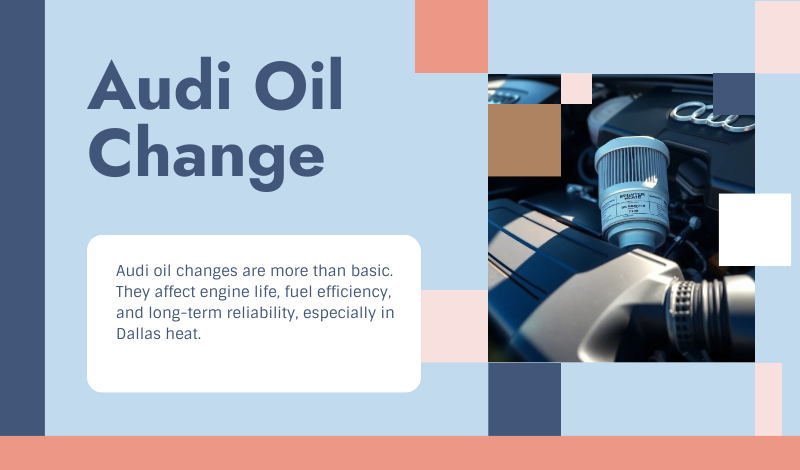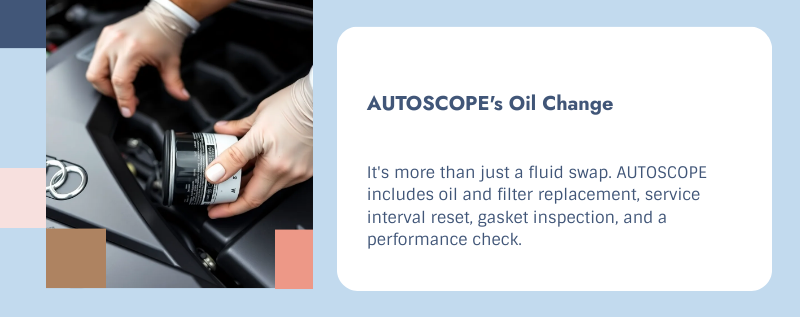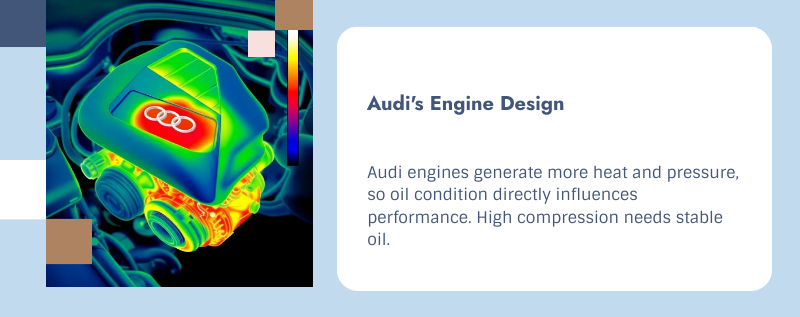What Audi Owners Really Need from an Oil Change Service
Audi vehicles are engineered for precision performance — from the way the engine delivers torque, to how the powertrain responds under load, to how the turbo system routes heat. That means an Audi oil change is not a basic maintenance task. It affects engine life, fuel efficiency, thermal management, and long-term reliability.
Drivers in the Dallas and Plano areas face additional variables: high temperatures, stop-and-go commuting, and short-trip driving, which accelerate oil breakdown faster than in cooler climates. When oil degrades, the engine works harder, heat increases, and wear compounds.
This is why Audi service requires more than a quick-lube operation or discount chain offering “premium oil.” The oil, filter, inspection, and reset procedures must follow Audi-specific specifications to maintain engine health and protect your long-term performance investment.
That is the standard we uphold at AUTOSCOPE European Car Care.
Why Audi Oil Changes Matter More in Texas Heat
High operating temperatures in Dallas and Plano put additional strain on Audi engines, making proper oil type, viscosity, and change intervals critical.
Every Audi engine — from a 2.0T turbo four, to the 3.0T V6, to the 4.0T in S and RS models — is engineered with tight tolerances and high compression ratios. These engines require oil that can withstand:
- High thermal cycling
- Turbocharger heat soak
- Extended idling in traffic
- Short trips that prevent full oil circulation\
In Dallas and Plano, elevated ambient heat accelerates oil oxidation. When oil breaks down:
- Viscosity drops
- Internal friction rises
- Metal components lose protective lubrication
- Turbos run hotter and wear faster
This is why Audi oil change intervals should be based on real-world driving, not just the dashboard reminder. In Dallas heat, 5,000–7,500 miles is often the optimal range for maintaining long-term performance.
Factory-Correct Oil Matters — And Not All “Full Synthetic” Is Equal
Summary: Only oils that meet Audi’s specific certifications (VW 502.00, 505.01, 507.00) provide the correct viscosity, detergent composition, and thermal resistance required for Audi engines.
Oil specifications are not marketing labels. They’re engineered requirements designed to protect:
- Turbo bearings
- Camshafts and lifters
- Timing chain tensioners
- Direct-injection fuel systems
- Emission control systems
At AUTOSCOPE, every Audi oil service includes:
| Component | Standard Quick-Lube Shops | AUTOSCOPE European Car Care |
| Oil Quality | Generic full synthetic | Audi-approved VW-spec synthetic oil |
| Filter | Basic aftermarket filter | OEM or OEM-equivalent filter |
| Engine Inspection | Not included | Full multi-point inspection |
| Reset & Calibration | Often skipped | Proper service reminder reset and adaptation checks |
| Technician Expertise | General service | European Master Technicians |
Audi engines are engineered to a standard. We service them to the same standard.
What’s Included in an Audi Oil Change at AUTOSCOPE
This is a full-engine health service, not a fluid swap.
Your oil service includes:
- Removal and replacement of oil and OEM-grade filter
- Audi/VW-spec full synthetic oil fill at correct viscosity
- Inspection of all related gaskets and seals
- Coolant, brake fluid, and accessory belt visual assessment
- Turbo and PCV performance check
- Battery and charging system evaluation
- Underbody inspection for leaks, heat-shield issues, and hardware integrity
This is preventive protection, not reactive repair.
Why Audi Owners Choose AUTOSCOPE in Dallas & Plano
Depth of experience with European models ensures accuracy, efficiency, and long-term reliability.
Audi engines are familiar territory here. We service:
- A3, S3, RS 3
- A4, S4
- A5, S5, RS 5
- A6, S6, RS 6 Avant
- A7, S7, RS 7
- A8, S8
- Q3,
- Q4 e-tron
- Q5, SQ5
- Q7
- Q8, SQ8
- e-tron GT
- Q4 e-tron
- Q6 e-tron
- Q8 e-tron, SQ8 e-tron
- A6 e-tron
- RS e-tron
Our technicians do this work every day, not occasionally.
What that means for you:
- No guesswork
- No unnecessary parts replacement
- No shortcuts
Just precision, transparency, and European-grade care.
Recommended Audi Oil Change Intervals in North Texas
Adjust intervals based on engine type and driving pattern.
| Driving Pattern | Recommended Interval | Why |
| Mostly city driving in Dallas/Plano | 5,000 miles | Frequent heat cycling + short trip operation |
| Highway commute | 7,000 miles | Stable operating temperature under load |
| High-performance / S / RS models | 3,500–5,000 miles | Higher turbo output + oil shear demands |
| Rarely driven vehicle | Every 6–9 months | Prevent moisture and acid buildup |
If you’re unsure, we evaluate oil based on condition, not assumption.
How to Know Your Audi Needs an Oil Change Sooner
Audi engines will signal stress long before a warning light appears.
Watch for:
- Louder engine ticking on cold start
- Higher than usual idle RPM
- Turbo lag or “sluggish” acceleration
- Burning oil smell after highway driving
- Reduction in fuel efficiency
- Oil level dropping between services
These signs indicate oil viscosity breakdown — not just usage.
If you notice them, schedule immediately.
How Audi Engine Design Influences Oil Change Requirements
Audi engines generate more heat and internal pressure than the average vehicle, which means oil condition directly influences longevity, performance, and reliability.
Audi’s engineering philosophy centers on high compression, direct injection, and turbocharging — even in non-performance variants. These elements create greater internal force and temperature, which increases the importance of:
- Oil film strength
- Detergent stability
- Shear resistance
- High-temperature viscosity retention
In simpler terms: Audi engines work harder per combustion cycle — so the oil protecting those components must remain stable under conditions that deteriorate standard synthetic oils more quickly.
Turbocharged Engines Need Oil That Can Withstand Heat
Turbochargers operate by using exhaust gas to spin a turbine that forces extra air into the engine, increasing power output. The spindle inside the turbo spins tens of thousands of times per minute — and relies on engine oil for lubrication and cooling.
If the oil is low-quality, overheated, or broken down:
- Turbo bearings wear prematurely
- Excess heat reaches piston rings and cylinder walls
- Fuel efficiency and throttle response degrade
- Eventually, the turbo fails — often at a major repair cost
This is why Audi models with turbos (most models since the mid-2010s) require fresh, high-spec oil on a tighter interval than many generic service schedules suggest, especially in Dallas and Plano, where ambient heat compounds thermal stress.
Why Quick-Lube or Dealership-Alternative Shops Often Fall Short
Audi oil changes require specialized parts, tools, and software resets — none of which general service centers are set up to perform.
Many “fast oil change” or discount service shops rely on three assumptions:
- All synthetic oils are interchangeable
- All oil filters are similar
- Oil changes don’t require electronic adaptation resets
For Audi vehicles, all three assumptions are incorrect.
Oil Specification Compliance
Audi oil specifications (such as VW 502.00, 505.01, 507.00) dictate:
- Detergent chemistry
- Thermal expansion behavior
- Viscosity curve over temperature
- Protection for turbocharger bearings
- Carbon buildup prevention characteristics
These specifications are not optional. Incorrect oil can cause:
- Premature timing component wear
- Sticking piston rings
- PCV system contamination
- Accelerated turbo wear
Oil Filter Quality is Equally Important
Audi filters use:
- High-density media for capturing carbon and soot
- Correct bypass valve calibration to maintain oil flow under load
- Seals designed for Audi-specific housing pressures
Low-grade filters may cost less — but they can cause starvation, restriction, and contamination that the engine management system cannot compensate for.
Service Cycle Reset
Audi oil change service includes:
- Resetting service intervals
- Ensuring thermal and load models recalculate correctly
Skipping these resets can lead to incorrect internal engine management strategy — which affects efficiency, timing advance, and turbo modulation.
In short:
Audi service requires Audi-level process discipline.
This is where AUTOSCOPE differs from quick-lube chains or general shops.
Inspection Depth: The Hidden Value in a Proper Audi Oil Service
Oil change service is also a touchpoint to identify early-stage mechanical wear — preventing expensive future repairs.
During every Audi oil service, our technicians evaluate:
| Component | Why It Matters | Issues We Detect Early |
| PCV System | Regulates crankcase pressure | Whistling, idle instability, oil consumption |
| Turbocharger Wastegate & Lines | Controls boost pressure | Rattle, delayed power, overheating |
| Oil Separator & Breather | Manages oil vapor circulation | Smoke, rough cold starts |
| Valve Cover Gaskets | Common wear points with heat cycles | Oil seepage, burning oil smell |
| Coolant Hoses & Reservoir | Prevents overheating under Texas heat | Cracks, coolant loss, pump strain |
| Underbody Protection & Seals | Prevents external contamination | Hardware looseness, shield deterioration |
These are predictive indicators — meaning problems are caught before they become breakdowns.
Most Audi owners never notice these issues early because warning lights only appear once damage has already progressed.
A quality oil change is the first and best line of defense.
How Driving Habits Affect Oil Life in Audi Vehicles
Identical Audi engines may require very different service intervals depending on how they’re driven day-to-day.
Examples of driving patterns in Dallas and Plano:
Short-Trip, Urban Driving
- 5–10 minute drives
- Frequent stops
- Low sustained RPM
→ Oil never reaches full temperature → moisture and acids build → change sooner.
Highway Commuting to Downtown or North Dallas
- Sustained speeds
- Consistent engine temperature
→ Oil circulates properly → change on normal interval.
Performance or Spirited Driving
- Rapid acceleration
- Higher RPM ranges
→ Oil shears faster → more frequent changes required.
We evaluate condition, not just mileage — because engine environment matters more than odometer count.
How Seasonal Temperature Swings Impact Audi Oil Systems
Dallas and Plano experience hot summers and colder winter mornings, and oil behaves differently across that range:
- In heat: oil thins, increasing metal-to-metal contact
- In cold starts: oil thickens, delaying lubrication of upper components
This is why viscosity grade selection must match:
- Climate
- Engine type
- Driving style
- Load condition
At AUTOSCOPE, we choose oil weights that support thermal stability in Texas heat without sacrificing cold-start protection — something generic chains rarely consider.
Audi Oil Change Pricing: What to Expect
Pricing varies based on oil capacity, engine type, and filter specification.
AUDI engines use larger oil capacities and high-grade filters. Prices typically range based on model and engine size.
What matters most is the quality of oil and inspection depth, not a low headline price.
A cheap oil change can cost far more in:
- Timing chain repairs
- Turbo rebuilds
- PCV system replacements
- Catalytic converter failure
Proper servicing is an investment in preserving engine lifespan and resale value.
Locations — Schedule Your Audi Oil Change
Plano
601 Coit Rd
Plano, TX 75075
(972) 867-7467
White Rock (Dallas)
9796 Ferguson Rd
Dallas, TX 75228
(214) 320-8280
Protect Your Audi Engine with Precision Care
Your Audi is engineered to deliver performance, longevity, and refined driving feel — but only when serviced with the correct oil, filter, and technique.
In the Dallas and Plano climate, oil change quality is directly linked to engine health.
Choosing factory-correct lubricants and trained European technicians ensures your Audi performs the way it was built to — today, tomorrow, and 100,000 miles from now.
Schedule your Audi oil change with AUTOSCOPE.
Precision matters — and we maintain it.




